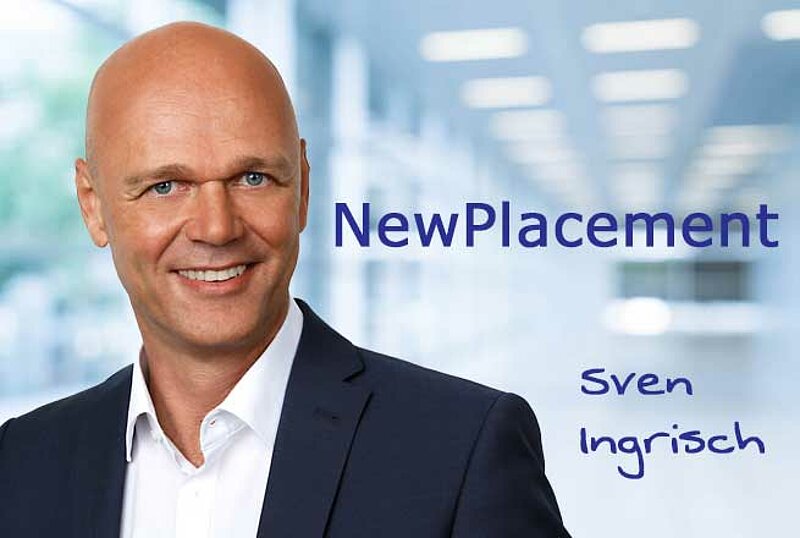Fallstricke im Bewerbungsprozess
Es gibt eine hohe Anzahl von Fallstricken im Bewerbungsprozess, die zum Abbruch führen können. Deshalb steht der NewPlacement-Coach über den gesamten Prozess zur Seite.
Pitfalls in the application process
Overview
#Address (09) #age (11) #Cancellation (03) #change motivation (13) #commercialregister (01) #CV (07) #Downgrading (05) #Job_advertisements (14) #Letter (17) #MicroManagement (20)
#Mobility (12) #Networking (06) #Onboarding (20) #Organization (16) #OwnCancellation (18) #References (04) #Review (10) #Sabbatical (02) #self-employment (15) #YourQuestions (08)
1. entry in the commercial register.
Many applicants with a previous executive function (board of directors, managing director, authorised signatory) suggest in their documents a continued presence in the previous company (since ... or until today), although the entry in the commercial register documents a dismissal or release that has already taken place. This Internet check after the "digital I" of the applicant is standard and necessary security for headhunters and and/or enterprise representatives. Therefore, in this case, you should split your last stop and have a proactive success story ready for the time after the removal from the commercial register. The longer the period of exemption lasts, the more clearly the interim period must be documented. Ideally, a NewPlacement coach with decades of management and coaching experience will be at your side.
2. sabbatical.
Periods of unemployment are often presented as a pure sabbatical without any intention (objective, time, place) in the CV of applicants. Similar to the "management consultant" stooge, who often comes along without industry focus, consulting products and projects, sabbaticals are also viewed very critically by headhunters or corporate decision-makers and questioned accordingly. With increasing length of a not credibly defined period of time, the mistrust grows that already headhunter colleagues might have discovered problems with you, and they already refrain from your application. Generally, gaps in the CV are searched for in the application process and a lack of acceptance or performance is assumed. The experienced NewPlacement-Coach helps you to work through these gaps in terms of content and coherence and achieves together with you an increase of your chances to get a new job.
3. use of the severance payment.
The severance pay is only an asset-building benefit if you are directly connected to a job. Otherwise, it should be used to top up unemployment benefits and for professional support and access to the job application market (investment in your future). If you only bet on the top-up, you are playing high poker. Even the first 1-2 spontaneous application projects, which can drag on for 8 weeks until a rejection, do not provide security for the job future and cost valuable time and financial reserves. In addition, if the application time takes longer than hoped, the acceptance on the application market for you decreases. Together with a NewPlacement-Coach you drive a professional parallelism on up to 8 runways to success and have not only statistically a shorter placement time than "severance pay eaters". Late insight is problematic; nevertheless, a conversation with NewPlacement is always worthwhile.
4. references.
Especially from your current or last company, they would like to have telephone references (boss, colleague) who worked closely with you. This can be problematic if the "china was broken" during the separation. But even in this case, the NewPlacement coach can help with creative solutions for selecting and involving reference givers. References should be asked for personally and appreciatively and become a "set screw" in the severance agreement. Testimonials are your written references and should not be in the same style or use similar generic terminology across recent stations. Otherwise, you will quickly be seen as the actual testimonial writer and the testimonials will lose their value. When drafting testimonials (closing paragraph, proactive change motivation, evaluation, times and job descriptions), you should rely on your NewPlacement coach's years of marketing & sales experience. At the same time, the draft should not be consistently "very good", but should have structure and serve the future objective. The so-called "main tasks" in testimonial language should not be transferred 1:1 into the CV, as this rather needs a factorial presentation for the matching between the job requirements and your multidimensional management record.
5. downgrading.
If you apply to headhunters/companies for positions below your current level, you suggest a lack of confidence in your experience and skills, and that you were overworked in your last position. Even if the company hires you at the lower level, there may be discrepancies with the supervisor, who may not yet have your experience level, or a bore-out on your part. Both could lead to a separation, often during the probationary period. This reduces your chances of a follow-up. However, if the job is interesting in terms of its content, you could consider it on an interim basis, regardless of level, in order to gain time to look for a longer-term position that is strategically right for you. However, NewPlacement experience is required when presenting this interim position in the CV.
6. networking.
Your network of contacts is an ideal source of information about current and future changes in your contacts' companies that could be relevant to you. However, it is, also because of compliance, influence and bypass HR, not a suitable transport channel for your application or your documents. This information should be sent via referral marketing directly to the relevant decision maker via a third party (hybrid, free of charge for the company). This is also how the relevant contacts from the NewPlacement network are handled. The maintenance of the contact network is often underestimated. It is difficult to reactivate contacts that you have not "served" for 5 or 10 years for your job search. For this purpose, NewPlacement has developed a corresponding multi-stage tool that helps you to revitalize or increase the "usable" contact network for your job search.
7. English CV.
Do not give your German CV to a native speaker for translation, but translate it yourself line by line at your language level. Otherwise you will suggest a wrong language level to your later interviewers in the application process (e.g. native instead of business fluent). Irritation and disappointment in the further application process and after starting the job are pre-programmed. The self-translation is also a perfect training for the upcoming English job interviews. After your translation, the NewPlacement coach will look for "stock errors" and replace them with better formulations. Afterwards, you will have an appropriate English "script" for the job interviews, which will give you confidence and sovereignty and also integrate the approximately 50 demand factors of the company accordingly.
8. your questions.
Your detailed interest in the new company, its culture and all the circumstances of the advertisement is absolutely understandable. However, corresponding questions, e.g. to the owner "How would you describe your leadership behaviour" or "What happened to the predecessor" or to the headhunter about very specific professional details, unfortunately often trigger discomfort in the interview partners in the application process. Since the progress after the first meeting is predominantly left to the "gut feeling", you should not trigger this negatively. In particular, there are always breaches of confidentiality in the early stages of the application process. There is a lot you can't ask about, you can only experience. For this purpose, read your company's principles on the homepage again now after the separation. Work out individual interview strategies, scripts as well as re-briefings by project and stage together with a NewPlacement coach. Empathy and acquired perspectives play a decisive role in this process. If you mentally sit in the other person's chair, you will find the right tone even in tricky situations.
9. address and contact person.
Unsolicited applications from managers at companies are aimed on the one hand at existing vacancies that are in the internal or concealed filling phase, and on the other hand at latent dissatisfaction that requires a change impulse from a suitable applicant. Here, many mistakes are made with regard to the acting persons, communication channels, approach and contact persons as well as neglect of confidentiality. In this case, the telephone approach is only recommended if there is a resilient familiarity with the specialist superior for the position in question. Telephone inquiries in the personnel department, sending in portfolios as well as enlisting contacts in the company only lead to the goal in rare cases, especially in the case of change impulses, and can even close doors. Therefore, these initiatives should always take place top-down, without application character and ideally from a third party as a postal hybrid recommendation with appropriate bridging.
10. looking back in anger at the previous company.
It is especially common to violate the principle of the application process "All previous companies, supervisors, colleagues, employees and partners are and remain great". This leads to a transformation "What will he say about us when he leaves us again". This is why "separation by mutual consent" or litigation with the previous employer combined with refusal to provide phone references are problematic "selling points" for your application. A move to the competition can also cause concern at the new company. However, if you take a step back when looking back and see all sides, it is no longer difficult, together with the NewPlacement-Coach, to recognize and communicate the many positive aspects. This gives the new company and its decision-makers security, especially with regard to loyalty.
11. attitude towards own age.
In response to the question of a prospective client as to whether he, at the age of 58, will ever get another adequate management position, we can only remind him that he has considerably more performance and experience values to show than a 35-year-old. If a company is looking for a "storm-tested" manager, he can hold his own against anyone younger. Another prospect simply omitted his age from the application document, communicating "I'm afraid I'm too old." Yet all any headhunter needs to do is take a quick look at school and education records to assess age. Conversely, some young professionals also struggle in the application process with assumed concerns about age and early responsibilities. NewPlacement consistently focuses on achievements, experience, competencies as well as social intelligence and confidently handles any age.
12. mobility.
If you are restricted in your mobility and flexibility with regard to a new job due to a property, your partner's job, your children's school and social environment, parents in need of care and circle of friends, the job alternatives are naturally also reduced accordingly. Solutions in the form of career setbacks, longer sabbaticals, weekend relationships or interim solutions must be weighed up very carefully. A promised shift in the center of life after the probationary period also includes the family and is usually demanded. Our comprehensive NewPlacement strategy helps decisively in this situation, e.g. with regard to the (inter)national set-up for the job application market, dealing with headhunters, own rejections (reasons), dream job outside the region with family re-positioning, interim activities and "secret" further search in your current region.
13. change motivation.
The testimonial wording "The separation took place by mutual/best agreement" generates inquiries and the need for references in the previous company for every headhunter and decision-maker. Was there a termination on the part of the company and a legal dispute? Why did they want to part ways and why did they not try anything to retain the executive despite restructuring. Even if the separation was proactive on the employee's part, was there an internal counteroffer? Why did the executive want to leave the company when he or she did not yet have a new job lined up? Questions upon questions that can easily lead to a dangerous corner and abandonment of the application process. The current, but also the previous change motivations show an important career aspect for headhunters and decision makers. Therefore, the coherent success presentation, which one develops with the NewPlacement coach individually for project and stage in each case, should consider for the transitions professionally and comprehensively.
14. analysis of job advertisements.
More than 25 years ago, a job ad said "Please apply only if you understand this ad." Cheeky? No, it showed the problem even then that sometimes 50% of applicants didn't even bother with the "indispensable" demand factors. The succinct reply of the applicants "but I could imagine the job" is not really target-oriented and can lead to burning for further projects. In addition, a matching check should also be carried out with regard to the decision-makers in the company, the corporate culture and the current situation in the industry. The more you as an applicant can convey matching certainty from your own background, the higher your chances in the application process and of being accepted. An experienced NewPlacement coach is very helpful in researching and extracting the demand factors. This is shown by the many successful application processes of our candidates.
15. self-employment to improve the starting position in the job application market.
A contradiction? In times of leave of absence or after leaving the company, your thematic specification, with which you could currently help companies, is a professional door opener, which has already become permanent positions for years. The approach of making your professional skills available to several companies is, after a successful permanent position, a (temporary) alternative to permanent employment or its initial spark. However, the issue of cold acquisition and lone wolves is underestimated. Networks are only conditionally door openers depending on their unsupported awareness. This is where the experienced NewPlacement coach can be helpful with his 8 runway strategy. Together, an attractive offer is developed on the basis of your management balance sheet and launched via referral marketing.
16. leap into the fiscal unity.
One should hold the first organ position for at least 3 years to establish oneself at this level. By jumping into organ ownership, you can also overcome a potential 50-plus issue. But beware of taking too big career steps without the appropriate preparation and basis. The following overstrain then often results from own micro-organization, lack of policy experience and underestimation of additional responsibility for new areas (e.g. CFO with HR and SCM). Although one is proud to be trusted with this additional responsibility, it carries the risk of being caught between two stools if one fails. The return to the old level is no longer offered because of under-demand and the threat of a bore-out, and the higher level is no longer offered because of "proven" over-demand. The experienced NewPlacement-Coach supports you situationally through a sparring, RescueCoaching or a NewPlacement. A consulting example
17 Are cover letters really obsolete?
Standardised cover letters with the usual introductory phrases "I have read your advertisement", "the advertised position particularly appeals to me" or "I am looking for a job" and the pure description of the attached background can be saved. However, if you use individualized cover letters for matching, objection handling, positioning, interpretive authority (including job hopping, apprenticeships and short stints, downward mobility) of the career, proactive change motivation as well as important information on salary level, mobility and availability, the application receives a clear added value. Cover letters should be content-oriented and need not strive for a Nobel Prize in literature. They should fit as an e-mail text on a DIN A4 page and must contain name and contact details at the end as a short imprint. Scanned signatures are suppressed as images in most inbox systems and displayed with a blank box. It is worth investing the appropriate time for each project, together with an experienced NewPlacement coach. Often the cover letter decides on the opening of the attached pdf file of the application.
18. own cancellations.
The following scenarios are conceivable: There are 2 contracts from new companies at the same time, there is a 1b contract and you are waiting for the notified 1a contract or there is only a 1b contract (bird in the hand). The NewPlacement utility value analysis helps in the decision-making process. However, you should make sure that your own rejections are appreciative and comprehensible, should you wish to come back to them. If you have made the wrong decision and it comes to a separation during the mutual probationary period, you can then revitalize cancelled projects (avoid 2nd choice feelings at the company at all costs). General cancellations due to lack of mobility with headhunters associates a lack of flexibility and should therefore be framed differently. If you want to continue searching after an acceptance or the dream job comes during the already running probationary period, this must be done absolutely covertly and limited to individual projects. Should the new employer or the headhunter (3rd rate after probationary period) become aware of this, NewPlacement crisis management is required.
19. onboarding.
After signing the contract, you have usually only won over 2-3 decision-makers in the company. The first 100 days should be used to win over committees, other managing directors, colleagues, employees, customers and external partners (suppliers, agencies). The 5:55 method is particularly helpful when first getting to know each other, and at meetings the transformation into the previous career, instead of rash strategy proposals. It is also crucial to uncover the many red lines of relationships within and outside the company (who with whom and why), for understanding and political behaviour. As a new leader, you will also have to deal with turf demarcation or expansion from colleagues. Onboarding coaching by an experienced NewPlacement coach with preparatory organizational mapping and on-demand provides job insurance.
20. dangers in the probationary period - micromanagement.
Candidates who make the leap to the board often still tend to micromanage. In his new role as CFO, the former finance director continues to focus mainly on the day-to-day financial business and lacks balanced delegation and control. In his other areas of responsibility, such as HR, SCM and legal, he largely stays out of it. In his micro area, he limits and demotivates his finance staff by his constant interference in the day-to-day business. This becomes all the more dangerous when they have good informal relationships and drive his departure. In the other areas, he shows himself to be insufficiently informed and competent vis-à-vis owners or committees. In these cases, separation often occurs during the probationary period. But before it gets that far, the experienced NewPlacement-Coach can defuse the situation through an early warning system and case coaching, among other things, and support the candidate in managing the company.
Further information
On our website you can find out more about the extensive
o internal career directory
o FAQ on OutPlacement
o Interviews OutPlacement & Career
o FAQ of the companies
and the horizontal sliders provide very quick information on all phases of career development and professional change.
For an individual and personal assessment, please arrange a free, no-obligation information meeting with your future coach.
Contact by phone, e-mail or contact form
We guarantee all interested parties absolute confidentiality, non-disclosure of your data and security in accordance with our privacy policy. You can also contact us anonymously. We vouch for this with our more than 30 years of tradition.















